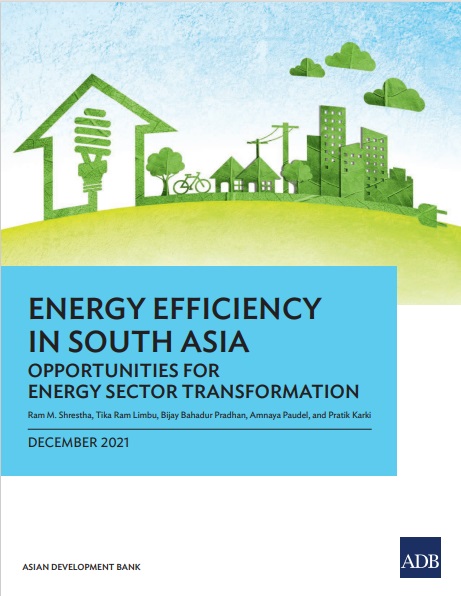🌿 COP 30 - Building a Greener Tomorrow
The 30th UN Climate Change Conference (COP 30) is taking place in Belém, Brazil. Stay informed about global climate actions, negotiations, and live sessions from 10 – 21 November 2025.
Get Updates
ENERGY EFFICIENCY IN SOUTH ASIA OPPORTUNITIES FOR ENERGY SECTOR TRANSFORMATION

Files
Date
January, 2024Author(s)
- Ram M. Shrestha
- Tika Ram Limbu
- Bijay Bahadur Pradhan
- Amnaya Paudel
- and Pratik Karki
Abstract
A sustainable energy system bears special significance to the member countries of the South Asia Subregional Cooperation (SASEC) Program. Accounting for over one-fifth of the world’s population, SASEC member countries still depend on fossil fuels, which have adverse effects on the environment and implications on energy security and climate change. As such, the wider deployment of renewable energy and energy-efficient technologies is a growing imperative in South Asia. Tackling climate change, building climate and disaster resilience, and enhancing environmental sustainability is an operational priority of the Asian Development Bank (ADB) under its Strategy 2030. Through clean energy financing, ADB is actively supporting its developing member countries in their pursuit of low-carbon and climate-resilient development. This ADB study analyzes various issues regarding energy efficiency and the development of sustainable energy systems in SASEC member countries: Bangladesh, Bhutan, India, Nepal, and Sri Lanka. It also provides an overview of the national institutions along with policies, laws, regulations, and initiatives on energy efficiency and conservation in these countries. Recognizing the important role that regional cooperation plays in the promotion of energy efficiency, this study discusses different avenues for collaboration among governments in the national, state, and local levels. It also highlights opportunities for changes in energy mix that are beneficial to these countries and others in South Asia. Various technologies that can be developed and deployed in the region to help conserve energy and save costs are also identified. The findings and information presented can provide national energy planners, policy makers, and other stakeholders in South Asia with a better understanding of how and why energy efficiency is essential to achieve sustainable and low-carbon economic development.
Citation
The authors of this study are Ram M. Shrestha, Tika Ram Limbu, Bijay Bahadur Pradhan, Amnaya Paudel, and Pratik Karki. Ram M. Shrestha is an Emeritus Professor of the Asian Institute of Technology, Thailand. Tika Limbu is currently Principal Portfolio Management Specialist at the Bangladesh Resident Mission of the Asian Development Bank. Bijay Bahadur Pradhan is a doctoral candidate at Sirindhorn International Institute of Technology, Thammasat University, Thailand. Amnaya Paudel and Pratik Karki are independent researchers.
Publisher
ASIAN DEVELOPMENT BANK
Rights Holder
ASIAN DEVELOPMENT BANK
URI
https://knowledgehub.pksf.org.bd/collections/dXFZVVhPVVFYN0ZicFJhTysxaDF3Zz09
